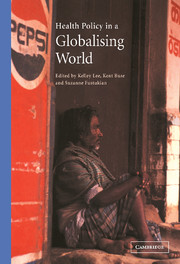Book contents
- Frontmatter
- Contents
- List of figures
- List of tables
- List of boxes
- Notes on contributors
- Foreword
- Preface
- Acknowledgements
- Abbreviations
- Part I
- Part II
- 9 Global rhetoric and individual realities: linking violence against women and reproductive health
- 10 The globalisation of DOTS: tuberculosis as a global emergency
- 11 Ageing and health policy: global perspectives
- 12 Workers' health and safety in a globalising world
- 13 Globalisation, conflict and the humanitarian response
- Part III
- References
- Index
- References
12 - Workers' health and safety in a globalising world
Published online by Cambridge University Press: 22 September 2009
- Frontmatter
- Contents
- List of figures
- List of tables
- List of boxes
- Notes on contributors
- Foreword
- Preface
- Acknowledgements
- Abbreviations
- Part I
- Part II
- 9 Global rhetoric and individual realities: linking violence against women and reproductive health
- 10 The globalisation of DOTS: tuberculosis as a global emergency
- 11 Ageing and health policy: global perspectives
- 12 Workers' health and safety in a globalising world
- 13 Globalisation, conflict and the humanitarian response
- Part III
- References
- Index
- References
Summary
When wages less than the minimum are imposed on female garment workers in Bangladesh, that is a violation of the minimum wage law. When the workplace is put under lock and key with workers inside, that is a violation of human rights. When hundreds of these women die in a fire because they cannot get out, that is a human tragedy. When 27 million workers in the world's export processing zones are not allowed to organize in unions, that is a violation of workers' rights as well as human rights.
UNDP (1999)Introduction
Recent public health debate has focused attention and action on the health issues linked to the global trade of commodities such as tobacco (Yach and Bettcher 1998a,b; Baris and McLeod 2000; Bettcher et al. 2000), and the distribution of communicable diseases with global impact such as HIV/AIDS, cholera and tuberculosis (Lee and Zwi 1996; Lee and Dodgson 2000; Porter et al. this volume). However, a significant gap in the discourse around globalisation and health has been an analysis of the impact of global trade and production on the direct producers of global wealth – the workforce. In the current climate of intense global competition and mobility, many industries have shifted production to countries with lower labour costs, poorly organised and protected workers, and minimal environmental and safety regulations. Although such strategies may lead to short-term financial and employment gains, the longer-term consequences of damage to health and the environment are generally overlooked.
- Type
- Chapter
- Information
- Health Policy in a Globalising World , pp. 208 - 228Publisher: Cambridge University PressPrint publication year: 2002
References
- 1
- Cited by



